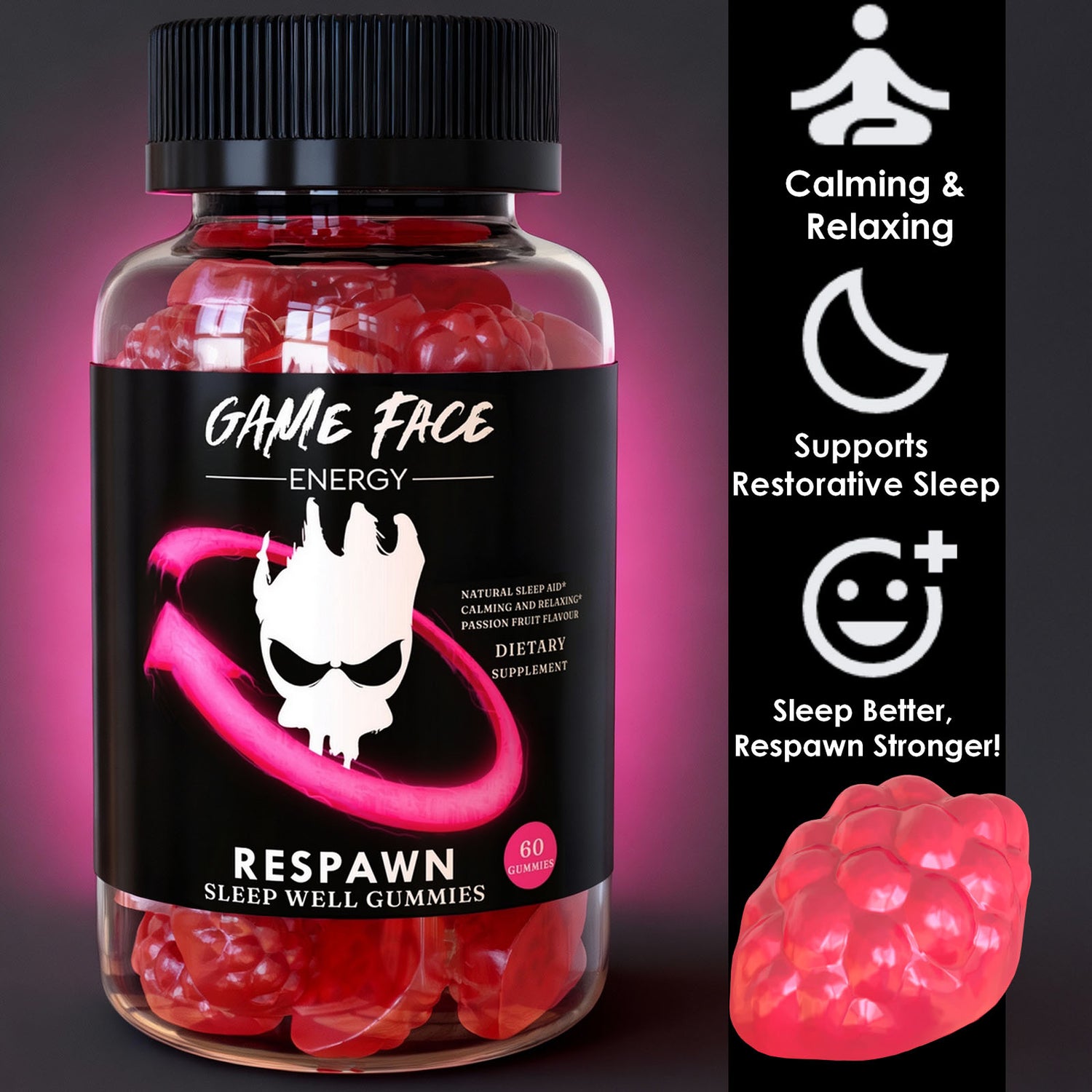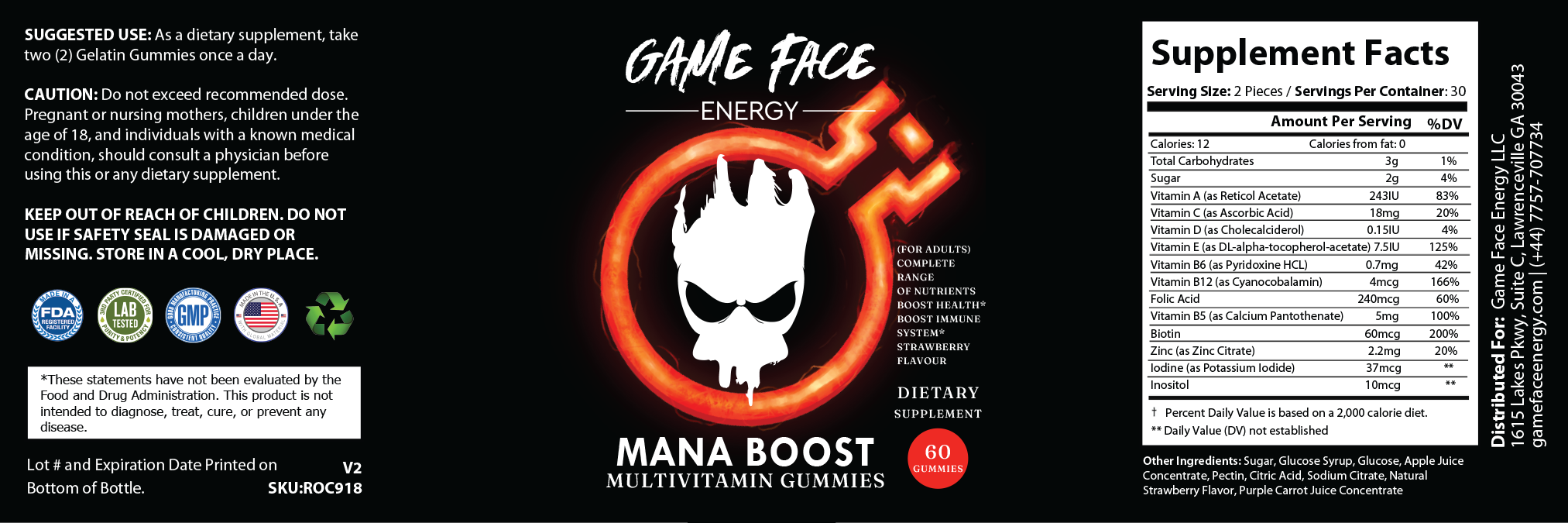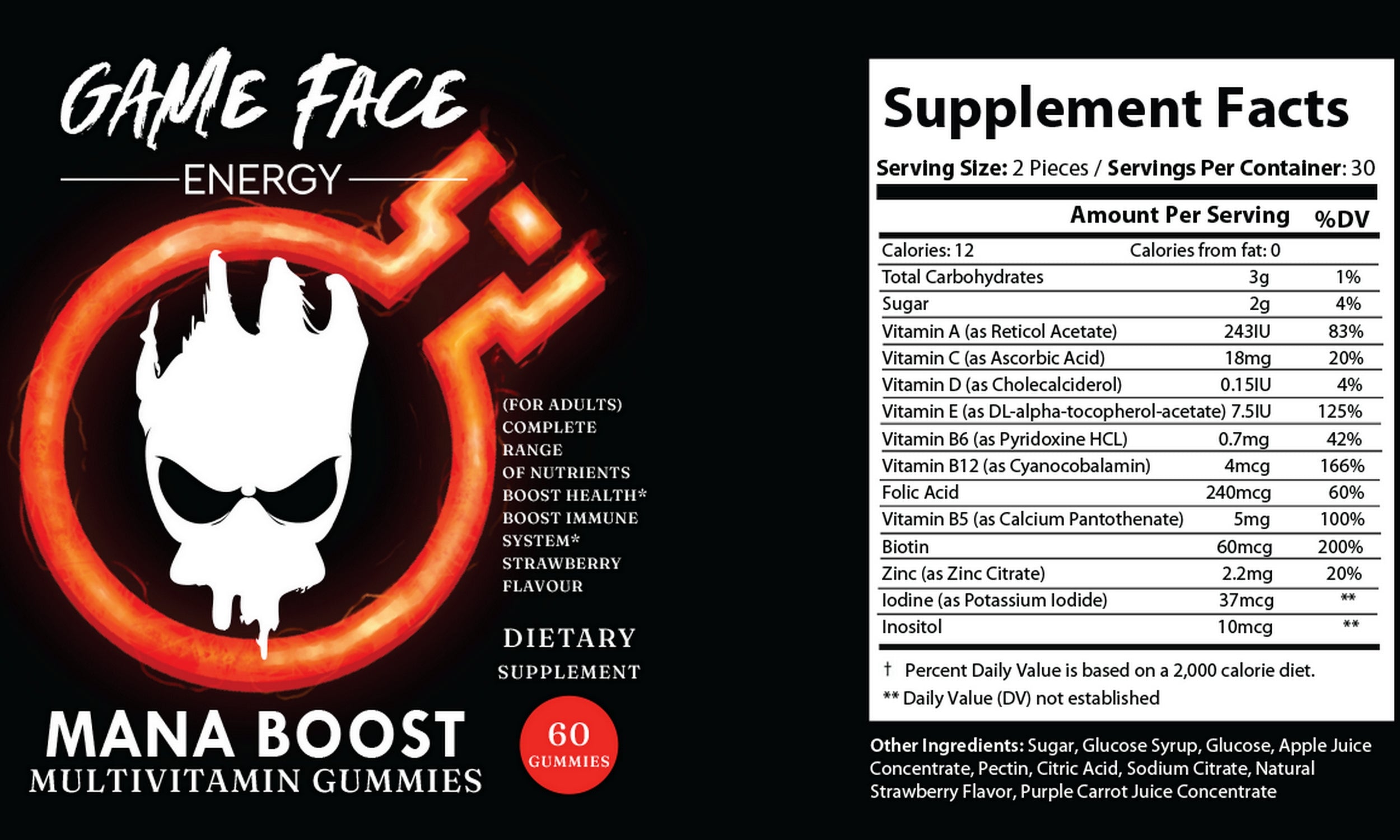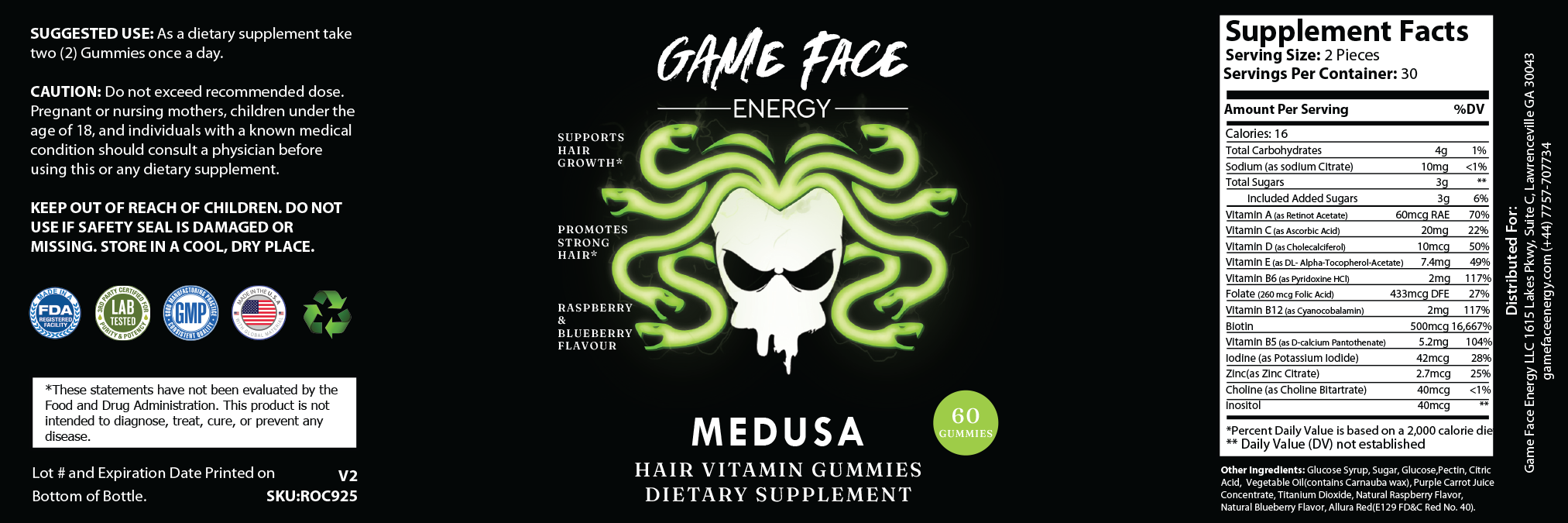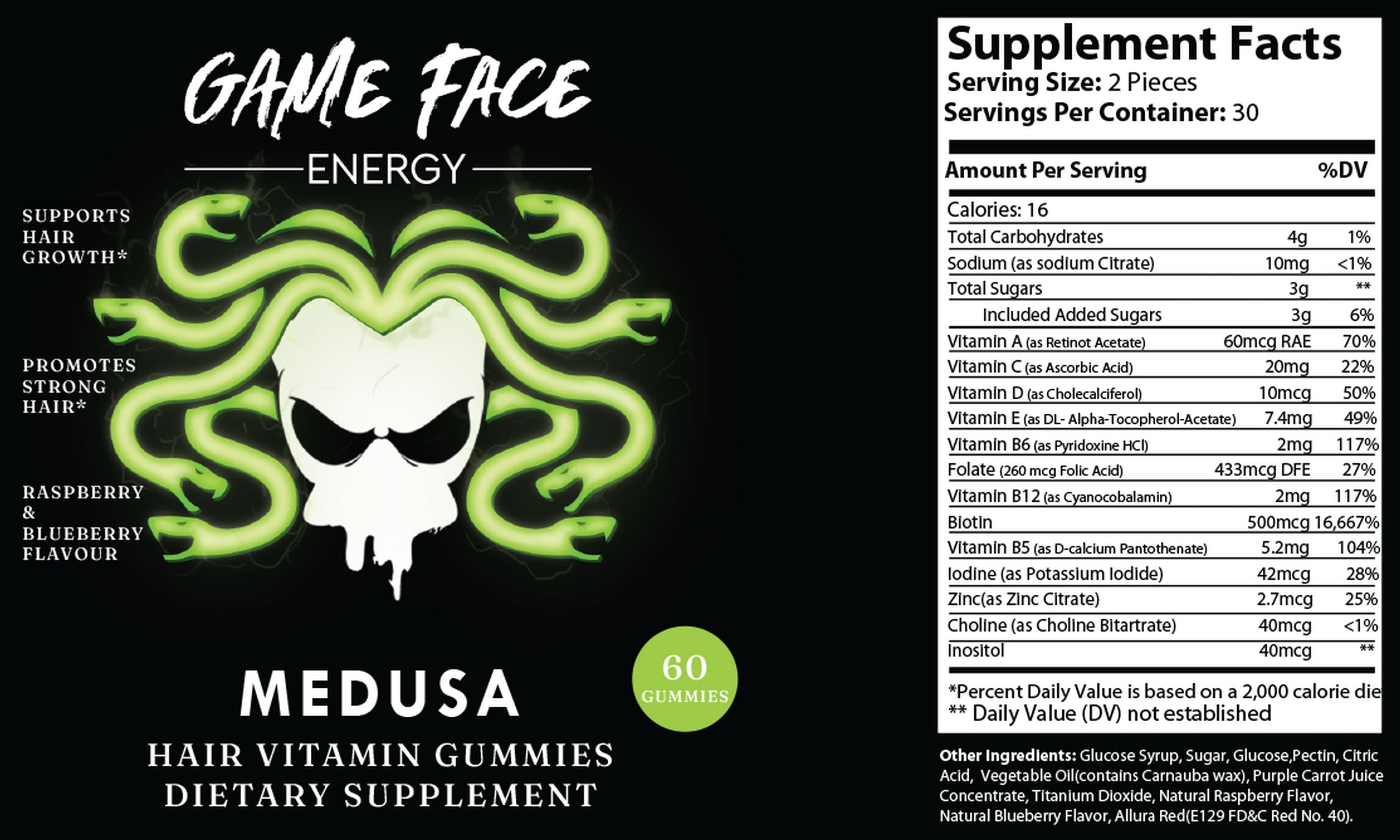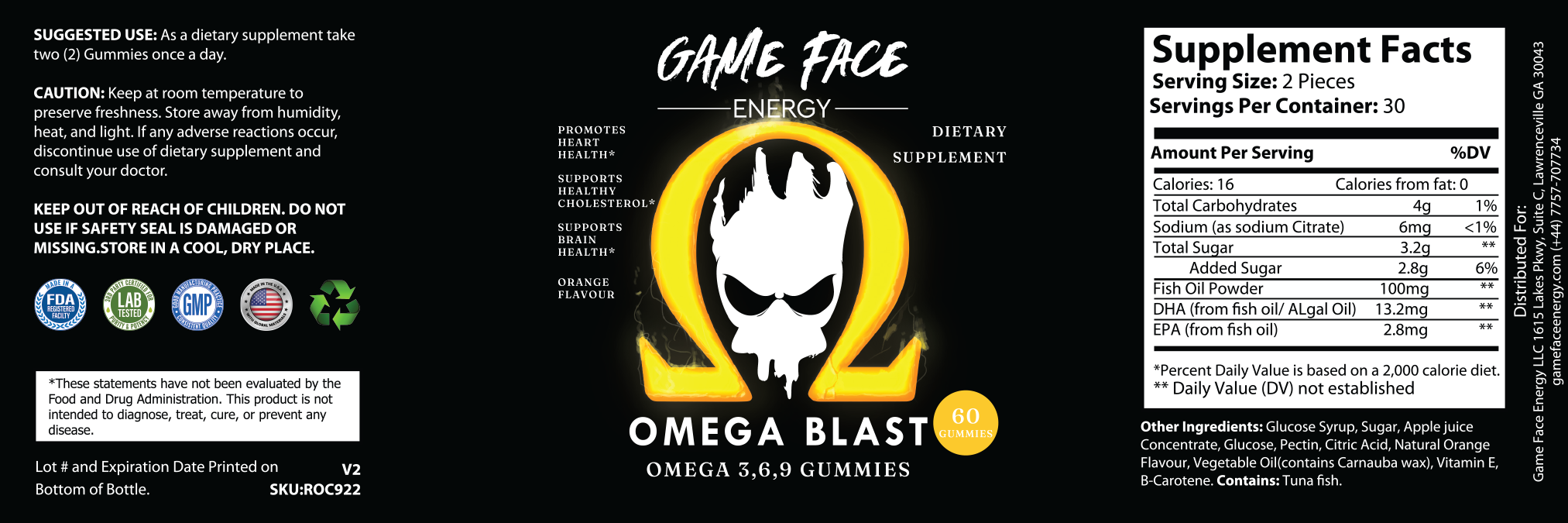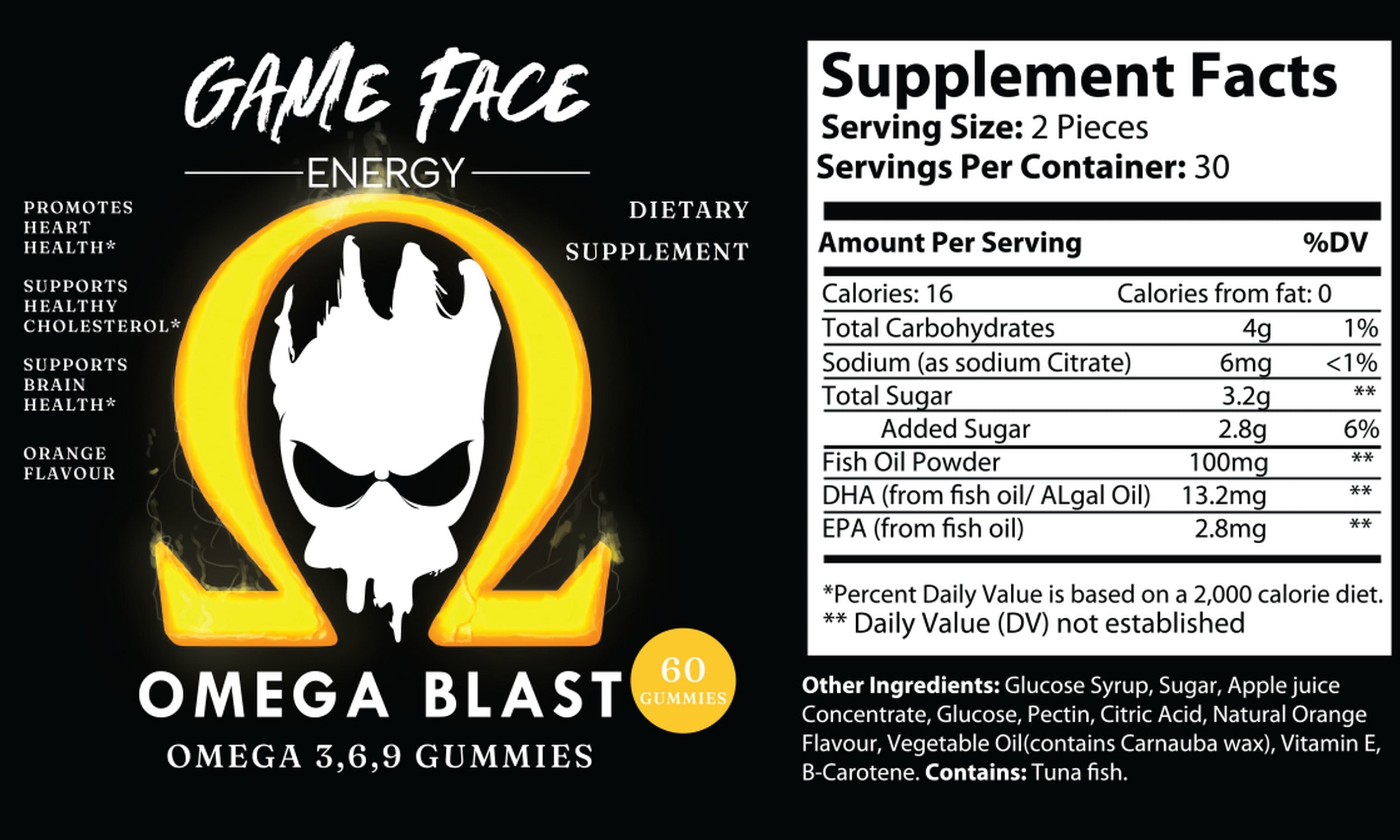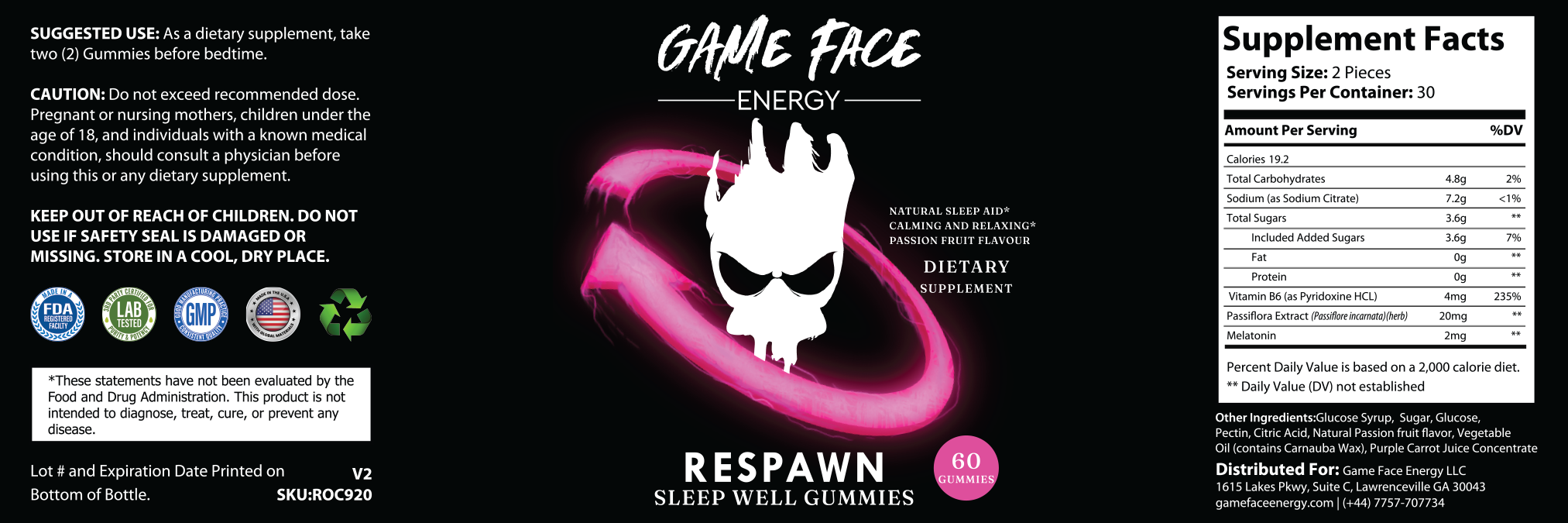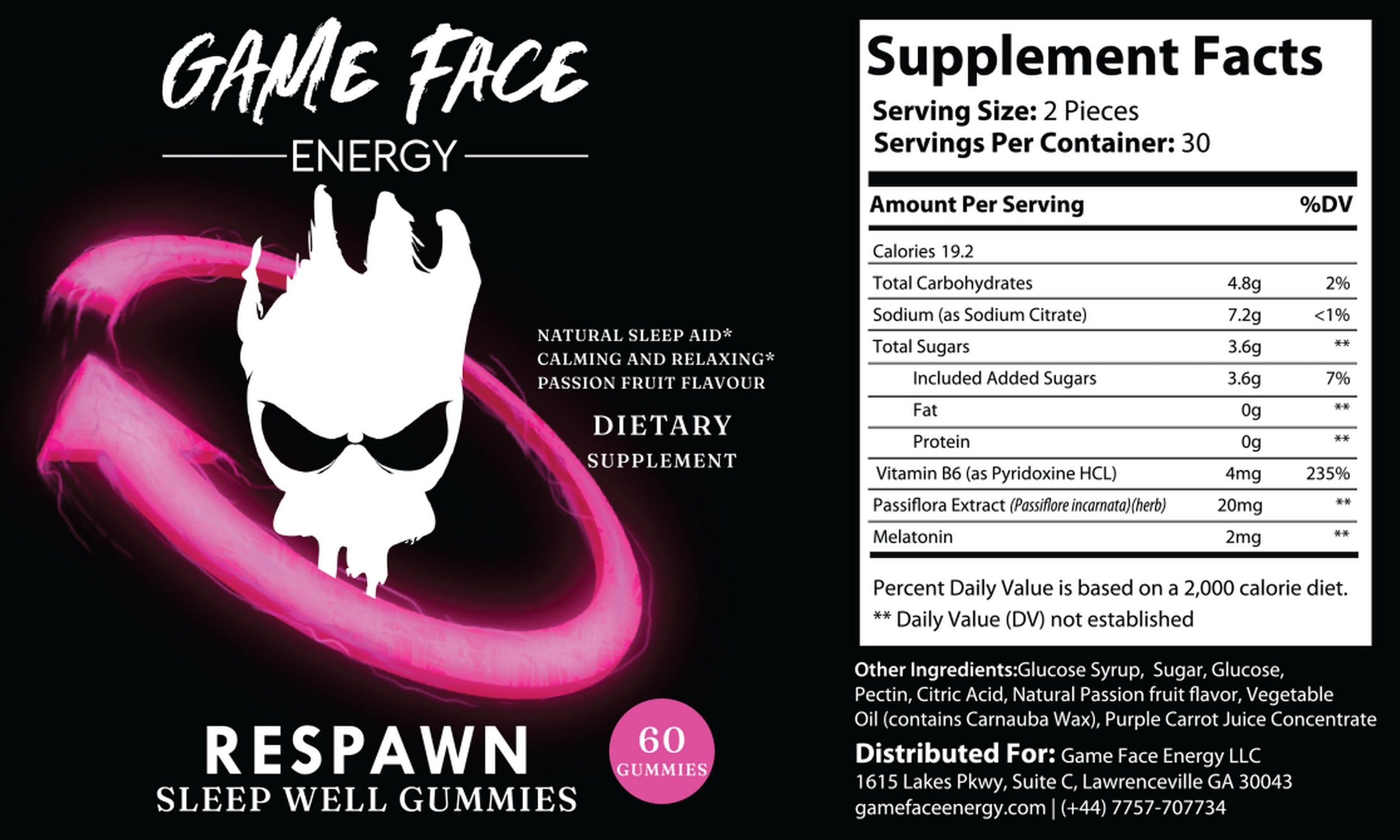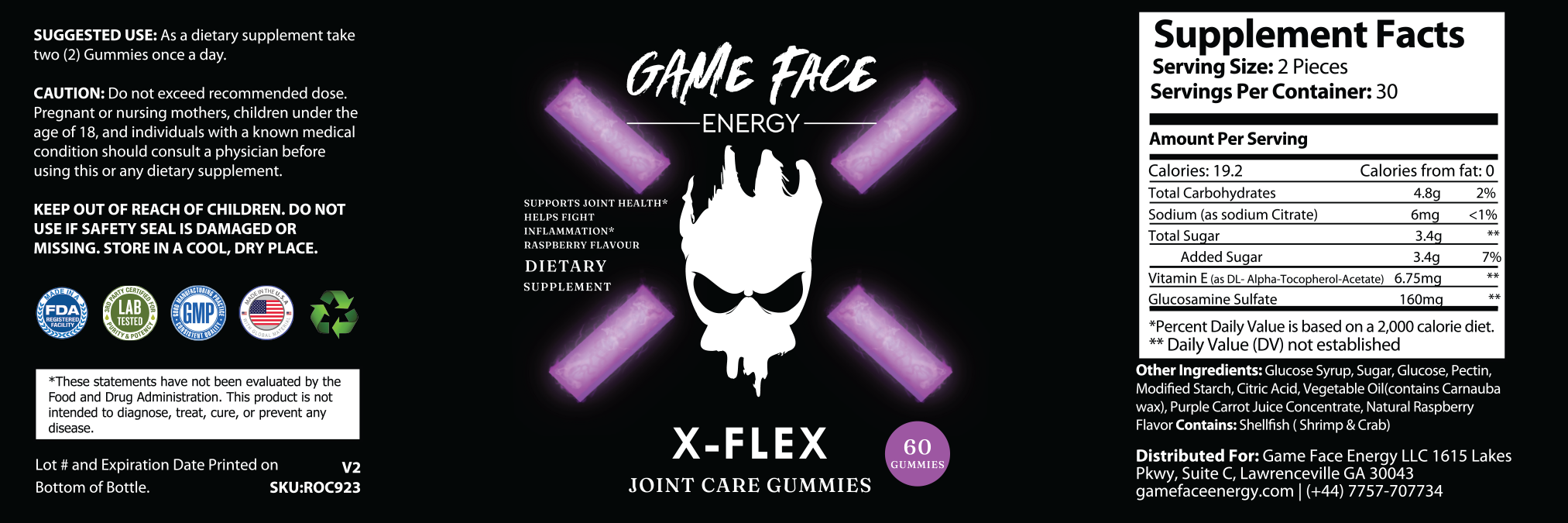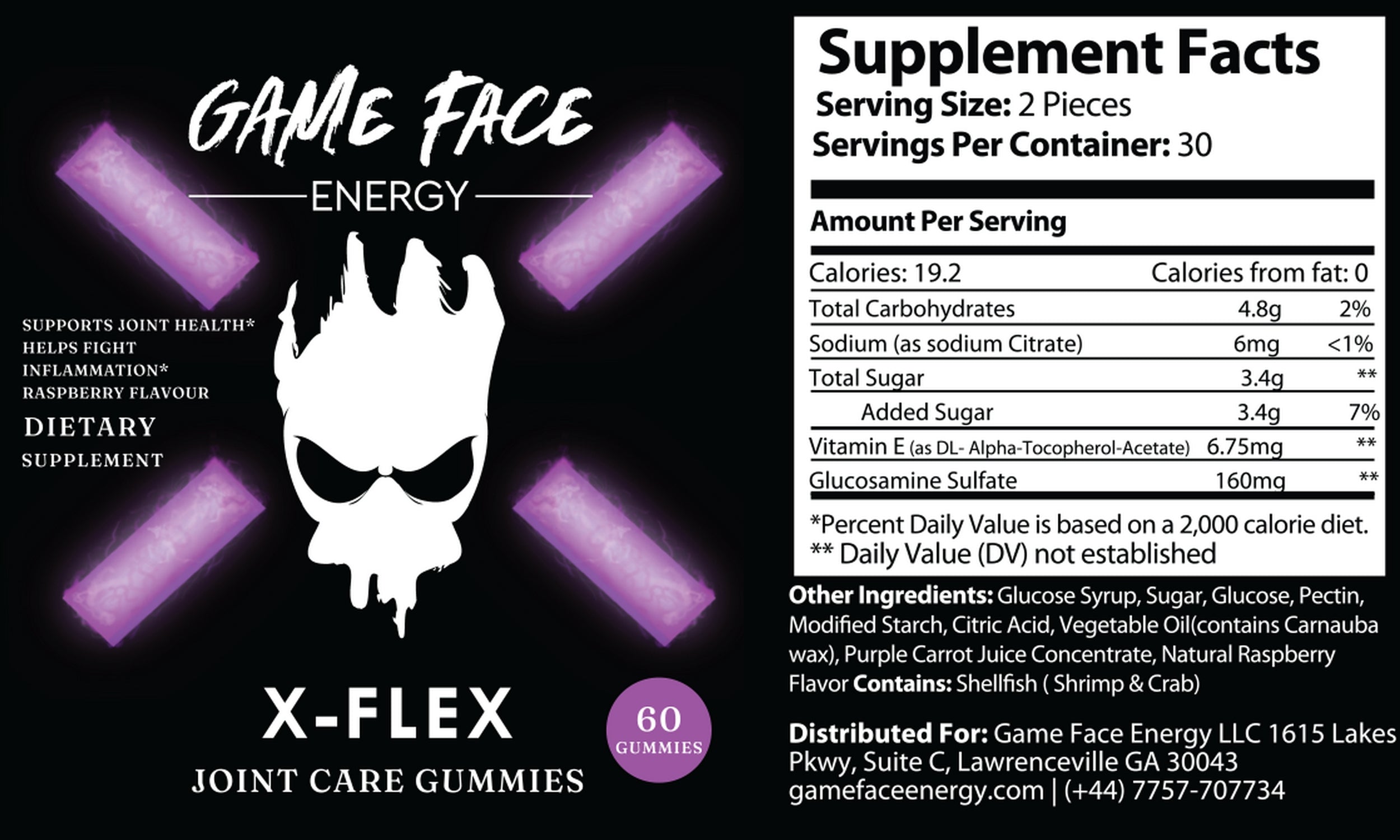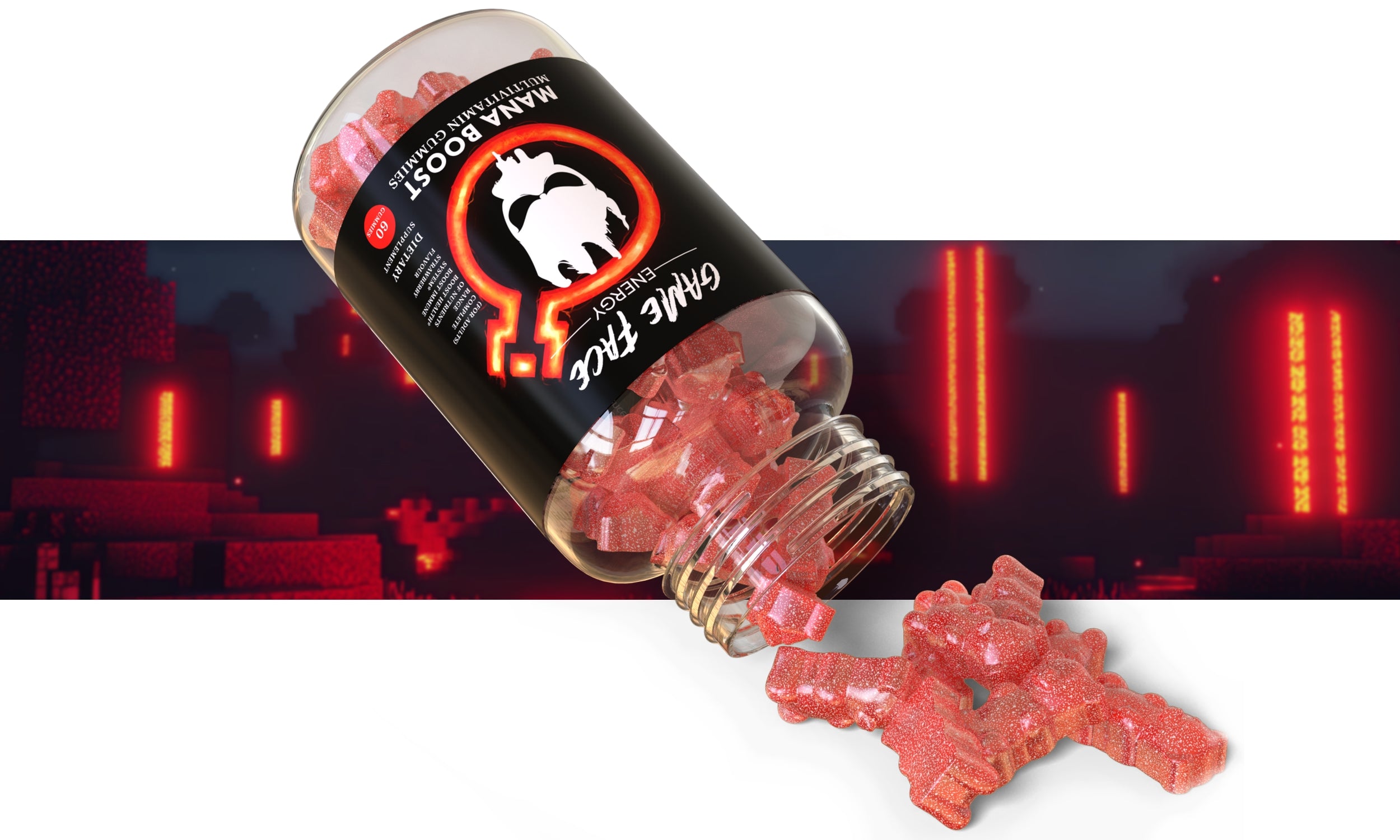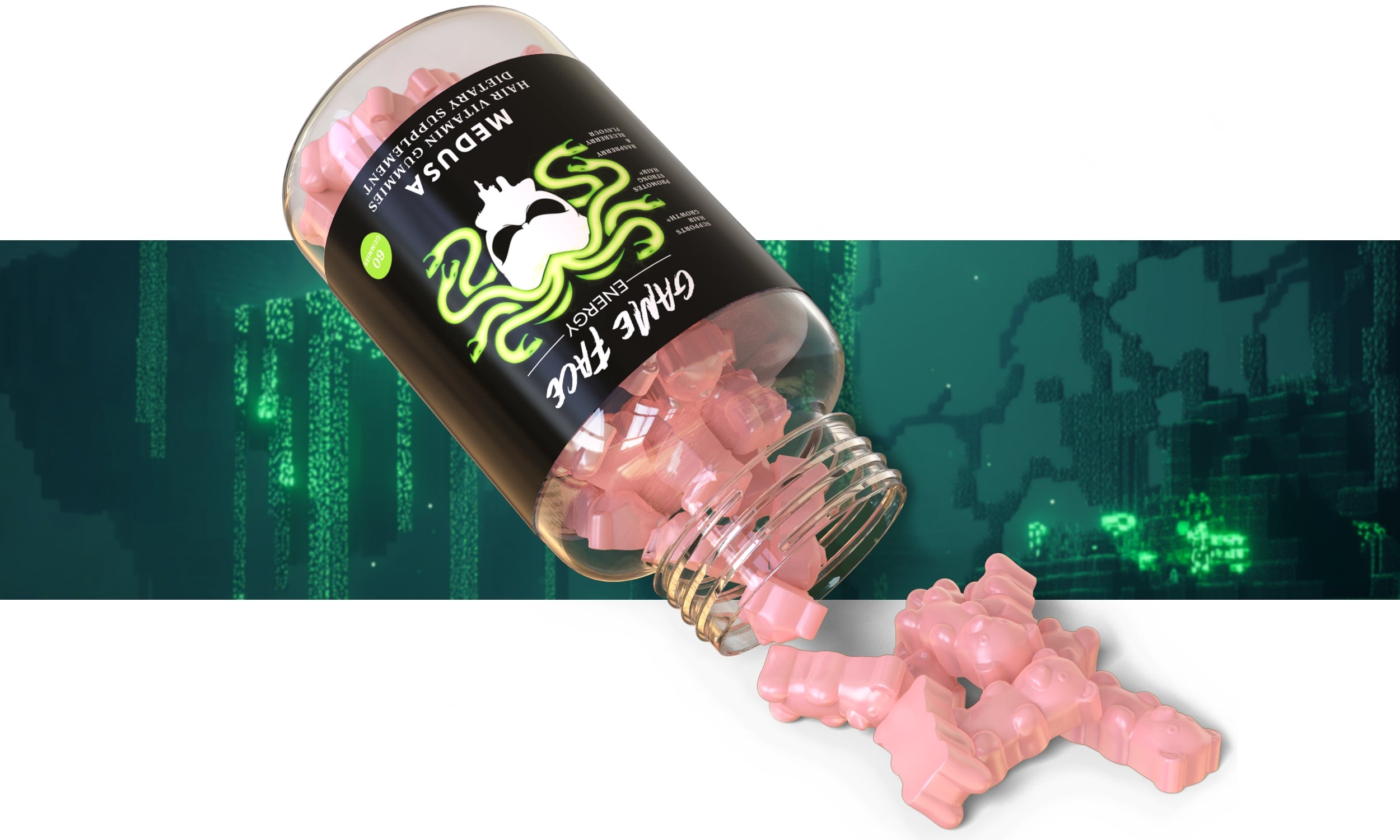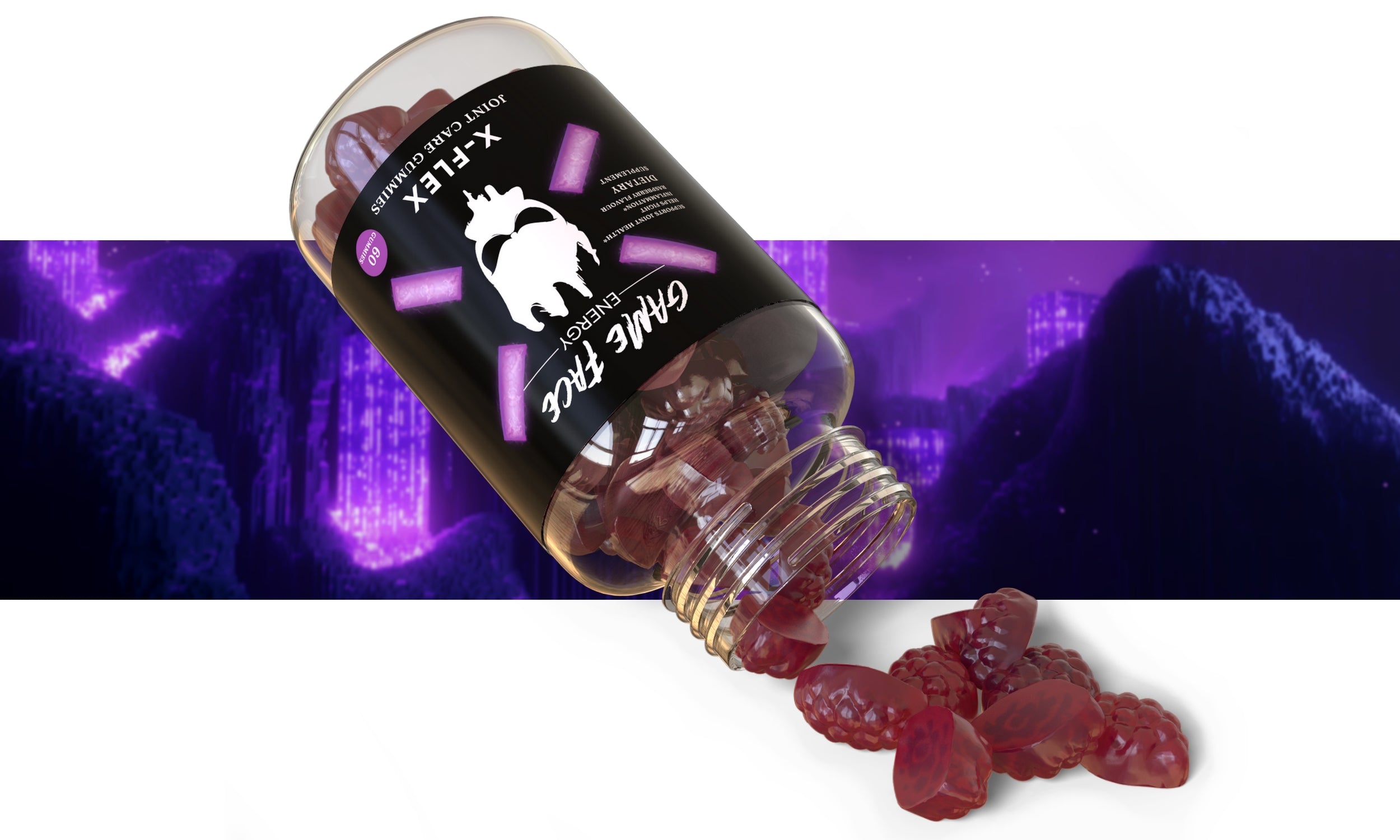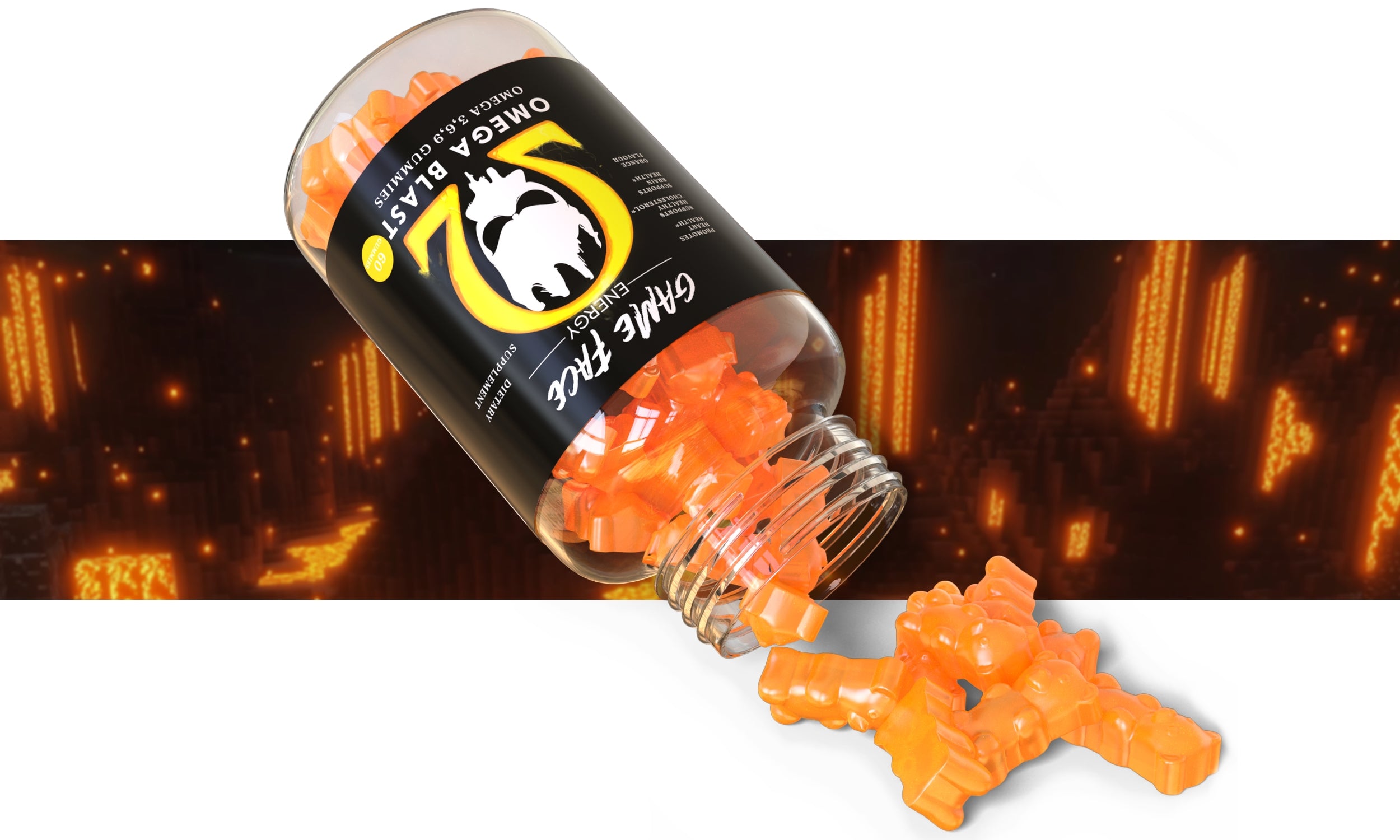
Peak Performance, On & Off Screen…
🎮 At Game Face Energy, we’re on a mission to help gamers, streamers, and video game enthusiasts achieve peak performance — both on and off the screen.
🎮 We understand that being at the top of your game also means taking care of your health, which is why we’ve crafted a line of gummies that are as effective as they are convenient.
🎮 Packed with premium, scientifically backed ingredients, our gummies are designed to fuel your focus, recovery, and overall well-being, without the hassle of pills or powders.
🎮 Made with gamers in mind, our products are delicious, portable, and easy to incorporate into your daily grind—because staying healthy should never slow you down.
🎮 Whether you’re gearing up for an intense gaming session, unwinding after a long day, or looking to stay sharp and energized, Game Face Energy gives you the boost you need to dominate every level of life.
🎮 Stay focused. Stay strong. Stay game ready.
RESPAWN
X-FLEX
MANA BOOST
MEDUSA
OMEGA BLAST
RESPAWN
X-FLEX
MANA BOOST
MEDUSA
OMEGA BLAST
RESPAWN
X-FLEX
MANA BOOST
MEDUSA
OMEGA BLAST
RESPAWN
X-FLEX
MANA BOOST
MEDUSA
OMEGA BLAST
RESPAWN
X-FLEX
MANA BOOST
MEDUSA
OMEGA BLAST
RESPAWN
X-FLEX
MANA BOOST
MEDUSA
OMEGA BLAST
RESPAWN
X-FLEX
MANA BOOST
MEDUSA
OMEGA BLAST
RESPAWN
X-FLEX
MANA BOOST
MEDUSA
OMEGA BLAST
MANA BOOST - Ingredients & Benefits:
Vitamin A
Vitamin A
● Supports vision health, skin health, immune health, and increases antioxidant support (182, 183).
● Supports antioxidant function via decreased inflammatory cytokines (inflammation), decreased reactive oxygen species, and increased l-glutathione production (master antioxidant).
● Supports visual health via increased amounts of plasma vitamin A in macular (eye) tissues.
Vitamin C
Vitamin C
● Supports immune, cardiovascular, skin, cognitive, fat burning, and digestive health (97, 98).
● Supports immune health via increased oxidant, free radical scavenging, and fueling neutrophilic (immune cell) activity in chemotaxis, phagocytosis, and microbial killing (97,98).
● Supports fat burning by increasing carnitine biosynthesis (molecule required for mitochondrial fatty acid oxidation) (97,98).
● Supports accelerate bone healing after a fracture, increase type I collagen synthesis, and reduce oxidative stress (inflammation) (98).
Vitamin D
Vitamin D
● Supports exercise performance, immune health, muscle growth, optimal bone health, hormonal health, immune function, increased sexual health, cardiovascular health, glucose tolerance, strength, and positive mood (77,78,79).
● Supports hormonal health via high amounts of vitamin D receptor(VDR) activity in hormone based negative feedback loop reactions(77,78).
● Supports cardiovascular health via improved absorption of calcium, reduced atherosclerotic activity, stimulating cardiomyocytes, and improved vascular health (77,78).
● Supports exercise performance via reduced exercise associated inflammation and muscle damage (77,78).
● Supports sexual health via increased activity of Vitamin D receptor activity of
testosterone production (79).
● Supports immune function via decreases of inflammatory cytokines and aiding immune cells (77,78).
● Supports joint health via regulating calcium and phosphorus and bone remodeling along with other calcium-regulating actions (77,78)
Vitamin E
Vitamin E
● Supports immune function, cognitive health, cardiovascular health, and bone health (204,205,206,207,208)
● Supports immune health via neutralizing free radicals and reactive oxygen species, and increased T lymphocyte-mediated immune function (204).
● Supports cardiovascular health via reduced cholesterol (204).
● Supports cognitive function via reduced oxidative stress, inflammation, and DNA damage of neuronal tissues (208).
Vitamin B6
Vitamin B6
● Serves as a cofactor in more than 150 enzymatic reactions associated in blood sugar regulation, immunity, cardiovascular function, neuronal health, metabolic, and digestive health (38, 40).
● Reduces plasma glucose (blood sugar levels) via by inhibiting the activity of
small-intestinal α-glucosidases (enzymes associated with glucose metabolism) (39).
● Functions as an antioxidant by counteracting the formation of reactive oxygen species (inflammatory markers) and advanced glycation end-products (38,40).
● May support blood sugar regulation in women with gestational diabetes (40).
● Cofactor for enzymes involved in DNA metabolism (40).
Vitamin B12
Vitamin B12
● Supports proper DNA synthesis, folate cycle function, energy production, cognitive function, and immune health (51,53).
● Aids as an antioxidant via direct scavenging of reactive oxygen species (inflammation), preserving l-glutathione levels (master antioxidant), and reducing oxidative stress (51).
● May prevent vitamin b-12 deficiency diseases such as anemia, neurodegenerative disease, cardiovascular disease, and osteoporosis(53).
Folic Acid
Folic Acid
● May support proper cell growth and DNA synthesis (65).
Vitamin B5
Vitamin B5
● Supports energy production, cell growth, cell repair, cognitive function, increased
hippocampal volume (memory), and optimized bioenergetics (burning of
carbohydrates, fat, and protein) (96)
Biotin
Biotin
● Supports conversion of food into cellular energy, hair health, skin health, and
cognitive function (213,214).
● Enhances glucose breakdown into skeletal muscle tissue (213,214).
Zinc
Zinc
● Supports immune function, skin health, cognitive function, and vision (172,173).
● Supports stimulation of the innate and adaptive immune system(172,173).
● Supports the activation of lymphocytes and activation of innate and T cell mediated immunity (172,173).
● Supports cognitive function by modulation of neuronal signaling in areas of the brain associated with memory and learning (hippocampus) (172,173).
Iodine/Kelp
Iodine/Kelp
● High bioavailable source of iodine and polyphenols (32).
● May support healthy thyroid levels in individuals with impaired thyroid function
(32).
Inositol
Inositol
● Supports liver detoxification, combats metabolic syndrome, and aids as an antioxidant (221).
● Combats metabolic syndrome via reduced levels of triglycerides, total-and
LDL-cholesterol (221).
● Supports antioxidant function via reduced levels of reactive oxygen species and inflammatory markers (interleukin 6) (222).
Sources:
Sources:
Vitamin A (Beta carotene):
182.Eggersdorfer, M., & Wyss, A. (2018). Carotenoids in human nutrition and health. Archives of biochemistry and biophysics,652, 18–26. https://doi.org/10.1016/j.abb.2018.06.001
183. Sunkara, A., & Raizner, A. (2019). Supplemental Vitamins and Minerals for
Cardiovascular Disease Prevention and Treatment. Methodist DeBakey cardiovascular journal,15(3), 179–184. https://doi.org/10.14797/mdcj-15-3-179
Vitamin C
97. Carr, A. C., & Maggini, S. (2017). Vitamin C and Immune Function.Nutrients,9(11), 1211. https://doi.org/10.3390/nu9111211
98. DePhillipo, N. N., Aman, Z. S., Kennedy, M. I., Begley, J. P., Moatshe, G., & LaPrade, R. F.(2018). Efficacy of Vitamin C Supplementation on Collagen
Synthesis and Oxidative Stress After Musculoskeletal Injuries: A Systematic
Review. Orthopaedic journal of sports medicine,6(10), 2325967118804544. https://doi.org/10.1177/2325967118804544
Vitamin D3
77. Chang, S. W., & Lee, H. C. (2019). Vitamin D and health-The missing vitamin in humans.Pediatrics
and neonatology,60(3), 237–244. https://doi.org/10.1016/j.pedneo.2019.04.007
78. Zhang, Y., Fang, F., Tang, J., Jia, L., Feng, Y., Xu, P., & Faramand, A. (2019).
Association between vitamin D supplementation and mortality: systematic review and meta-analysis. BMJ(Clinical research ed.),366, l4673. https://doi.org/10.1136/bmj.l4673
79. Pilz, S., Frisch, S., Koertke, H., Kuhn, J., Dreier, J., Obermayer-Pietsch, B., Wehr, E., & Zittermann, A. (2011). Effect of vitamin D supplementation on
testosterone levels in men. Hormone and metabolic research = Hormon-und
Stoffwechselforschung = Hormones et metabolisme,43(3), 223–225. https://doi.org/10.1055/s-0030-1269854
Vitamin E
204. Jovic, T. H., Ali, S. R., Ibrahim, N., Jessop, Z. M., Tarassoli, S. P., Dobbs, T. D., Holford, P., Thornton, C. A., & Whitaker, I. S. (2020). Could Vitamins Help in the Fight Against COVID-19?.Nutrients,12(9), 2550. https://doi.org/10.3390/nu12092550
205. Traber, M. G., & Atkinson, J. (2007). Vitamin E, antioxidant and nothing more. Free radical biology & medicine,43(1), 4–15. https://doi.org/10.1016/j.freeradbiomed.2007.03.024
206. Wu, D., & Meydani, S. N. (2014). Age-associated changes in immune function: impact of vitamin E intervention and the underlying mechanisms. Endocrine, metabolic & immune disorders drug targets,14(4), 283–289. https://doi.org/10.2174/1871530314666140922143950
207. De la Fuente, M., Hernanz, A., Guayerbas, N., Victor, V. M., & Arnalich, F. (2008).Vitamin E ingestion improves several immune functions in elderly men and women. Free radical research,42(3), 272–280. https://doi.org/10.1080/10715760801898838
208. Browne, D., McGuinness, B., Woodside, J. V., & McKay, G. J. (2019). Vitamin E and Alzheimer's disease: what do we know so far?. Clinical interventions in aging,14,
1303–1317. https://doi.org/10.2147/CIA.S186760
Vitamin B-6
38. Ueland, P. M., McCann, A., Midttun, Ø., & Ulvik, A. (2017). Inflammation, vitamin B6 and related pathways. Molecular aspects of medicine,53, 10–27. https://doi.org/10.1016/j.mam.2016.08.001
39. Bird R. P. (2018). The Emerging Role of Vitamin B6 in Inflammation and Carcinogenesis. Advances
in food and nutrition research,83, 151–194. https://doi.org/10.1016/bs.afnr.2017.11.004
40. Mascolo, E., & Vernì, F. (2020). Vitamin B6 and Diabetes: Relationship and Molecular Mechanisms. International journal of molecular sciences,21(10), 3669. https://doi.org/10.3390/ijms21103669
Vitamin B-12
51. van de Lagemaat, E. E., de Groot, L., & van den Heuvel, E. (2019). Vitamin B12in Relation to Oxidative Stress: A Systematic Review.Nutrients,11(2), 482. https://doi.org/10.3390/nu11020482
53.Shipton, M. J., & Thachil, J. (2015). Vitamin B12 deficiency-A 21st century
perspective. Clinical medicine (London, England),15(2), 145–150. https://doi.org/10.7861/clinmedicine.15-2-145
Folic Acid
65. Bailey, L. B., Stover, P. J., McNulty, H., Fenech, M. F., Gregory, J. F., 3rd, Mills, J. L.,Pfeiffer, C. M., Fazili, Z., Zhang, M., Ueland, P. M., Molloy, A. M.,
Caudill, M. A., Shane, B.,Berry, R. J., Bailey, R. L., Hausman, D. B.,
Raghavan, R., & Raiten, D. J. (2015). Biomarkers of Nutrition for
Development-Folate Review. The Journal of nutrition,145(7), 1636S–1680S. https://doi.org/10.3945/jn.114.206599
Vitamin B-5
96. Ragaller, V., Lebzien, P., Südekum, K. H., Hüther, L., & Flachowsky, G.
(2011). Pantothenic acid in ruminant nutrition: a review. Journal of animal
physiology and animal nutrition,95(1),6–16. https://doi.org/10.1111/j.1439-0396.2010.01004.x
Biotin
213. Mock DM. Biotin: From Nutrition to Therapeutics. J Nutr. 2017
Aug;147(8):1487-1492.doi: 10.3945/jn.116.238956. E pub 2017 Jul 12. PMID: 28701385; PMCID: PMC5525106.
214. Patel DP, Swink SM, Castelo-Soccio L. A Review of the Use of Biotin for Hair Loss. Skin Appendage Disord. 2017 Aug;3(3):166-169. doi: 10.1159/000462981. E pub
2017 Apr 27. PMID: 28879195; PMCID: PMC5582478.
Zinc
172.Maywald, M., Wessels, I., & Rink, L. (2017). Zinc Signals and Immunity. International journal of molecular sciences,18(10), 2222. https://doi.org/10.3390/ijms18102222
173.Wessels, I., Rolles, B., & Rink, L. (2020). The Potential Impact of Zinc
Supplementation onCOVID-19 Pathogenesis. Frontiers in immunology,11, 1712. https://doi.org/10.3389/fimmu.2020.01712
Iodine/Kelp
32. Aakre, I., Tveito Evensen, L., Kjellevold, M., Dahl, L., Henjum, S., Alexander, J.,
Madsen, L., & Markhus, M. W. (2020). Iodine Status and Thyroid Function in
a Group of Sea weed Consumers in Norway.Nutrients,12(11), 3483. https://doi.org/10.3390/nu12113483
Inositol
221. Tabrizi R, Ostadmohammadi V, Lankarani KB, Peymani P, Akbari M, Kolahdooz F, AsemiZ. The effects of inositol supplementation on lipid profiles among patients with
metabolic diseases: a systematic review and meta-analysis of randomized
controlled trials. Lipids Health Dis. 2018 May 24;17(1):123. doi:
10.1186/s12944-018-0779-4. PMID: 29793496; PMCID: PMC5968598
222. Formoso G, Baldassarre MPA, Ginestra F, Carlucci MA, Bucci I, Consoli A. Inositol and antioxidant supplementation: Safety and efficacy in pregnancy. Diabetes Metab Res Rev.
2019Jul;35(5):e3154. doi: 10.1002/dmrr.3154. E pub 2019 Apr 10. PMID: 30889626;
PMCID: PMC6617769.
MEDUSA - Ingredients & Benefits:
Vitamin A
Vitamin A
● Supports vision health, skin health, immune health, and increases antioxidant support (182, 183).
● Supports antioxidant function via decreased inflammatory cytokines (inflammation), decreased reactive oxygen species, and increased l-glutathione production (master antioxidant).
● Supports visual health via increased amounts of plasma vitamin A in macular (eye) tissues.
Vitamin C
Vitamin C
● Supports immune, cardiovascular, skin, cognitive, fat burning, and digestive health (97, 98).
● Supports immune health via increased oxidant, free radical scavenging, and fueling neutrophilic (immune cell) activity in chemotaxis, phagocytosis, and microbial killing (97,98).
● Supports fat burning by increasing carnitine biosynthesis (molecule required for mitochondrial fatty acid oxidation) (97,98).
● Supports accelerate bone healing after a fracture, increase type I collagen synthesis, and reduce oxidative stress (inflammation) (98).
Vitamin D
Vitamin D
● Supports exercise performance, immune health, muscle growth, optimal bone health, hormonal health, immune function, increased sexual health, cardiovascular health, glucose tolerance, strength, and positive mood (77,78,79).
● Supports hormonal health via high amounts of vitamin D receptor(VDR) activity in hormone based negative feedback loop reactions(77,78).
● Supports cardiovascular health via improved absorption of calcium, reduced atherosclerotic activity, stimulating cardiomyocytes, and improved vascular health (77,78).
● Supports exercise performance via reduced exercise associated inflammation and muscle damage (77,78).
● Supports sexual health via increased activity of Vitamin D receptor activity of
testosterone production (79).
● Supports immune function via decreases of inflammatory cytokines and aiding immune cells (77,78).
● Supports joint health via regulating calcium and phosphorus and bone remodeling along with other calcium-regulating actions (77,78)
Vitamin E
Vitamin E
● Supports immune function, cognitive health, cardiovascular health, and bone health (204,205,206,207,208)
● Supports immune health via neutralizing free radicals and reactive oxygen species, and increased T lymphocyte-mediated immune function (204).
● Supports cardiovascular health via reduced cholesterol (204).
● Supports cognitive function via reduced oxidative stress, inflammation, and DNA damage of neuronal tissues (208).
Vitamin B6
Vitamin B6
● Serves as a cofactor in more than 150 enzymatic reactions associated in blood sugar regulation, immunity, cardiovascular function, neuronal health, metabolic, and digestive health (38, 40).
● Reduces plasma glucose (blood sugar levels) via by inhibiting the activity of
small-intestinal α-glucosidases (enzymes associated with glucose metabolism) (39).
● Functions as an antioxidant by counteracting the formation of reactive oxygen species (inflammatory markers) and advanced glycation end-products (38,40).
● May support blood sugar regulation in women with gestational diabetes (40).
● Cofactor for enzymes involved in DNA metabolism (40).
Vitamin B12
Vitamin B12
● Supports proper DNA synthesis, folate cycle function, energy production, cognitive function, and immune health (51,53).
● Aids as an antioxidant via direct scavenging of reactive oxygen species (inflammation), preserving l-glutathione levels (master antioxidant), and reducing oxidative stress (51).
● May prevent vitamin b-12 deficiency diseases such as anemia, neurodegenerative disease, cardiovascular disease, and osteoporosis(53).
Folic Acid
Folic Acid
● May support proper cell growth and DNA synthesis (65).
Vitamin B5
Vitamin B5
● Supports energy production, cell growth, cell repair, cognitive function, increased
hippocampal volume (memory), and optimized bioenergetics (burning of
carbohydrates, fat, and protein) (96)
Biotin
Biotin
● Supports conversion of food into cellular energy, hair health, skin health, and
cognitive function (213,214).
● Enhances glucose breakdown into skeletal muscle tissue (213,214).
Zinc
Zinc
● Supports immune function, skin health, cognitive function, and vision (172,173).
● Supports stimulation of the innate and adaptive immune system(172,173).
● Supports the activation of lymphocytes and activation of innate and T cell mediated immunity (172,173).
● Supports cognitive function by modulation of neuronal signaling in areas of the brain associated with memory and learning (hippocampus) (172,173).
Iodine/Kelp
Iodine/Kelp
● High bioavailable source of iodine and polyphenols (32).
● May support healthy thyroid levels in individuals with impaired thyroid function
(32).
Inositol
Inositol
● Supports liver detoxification, combats metabolic syndrome, and aids as an antioxidant (221).
● Combats metabolic syndrome via reduced levels of triglycerides, total-and
LDL-cholesterol (221).
● Supports antioxidant function via reduced levels of reactive oxygen species and inflammatory markers (interleukin 6) (222).
Choline
Choline
● Essential for cell membrane integrity, cell messaging, fatmetabolism, DNA synthesis, immune support, and nervous system function (62,63).
● Serves as a methyl donor and as a precursor for production of cell membranes (62).
● Precursor for acetylcholine (neurotransmitter) which activates receptors in the central nervous system mediated immune responses(α7nAchR) (64).
● Lifelong choline supplementation may combat neurodegenerative diseases by reducing amyloid-β plaque load (plaques of degrading neurons) (62).
● Reduces concentration of total homocysteine (inflammation marker) in individuals with low levels of folate and other B vitamins (B₂, B₆, and B₁₂) (62).
Sources:
Sources:
Vitamin A (Beta carotene):
182.Eggersdorfer, M., & Wyss, A. (2018). Carotenoids in human nutrition and health. Archives of biochemistry and biophysics,652, 18–26. https://doi.org/10.1016/j.abb.2018.06.001
183. Sunkara, A., & Raizner, A. (2019). Supplemental Vitamins and Minerals for
Cardiovascular Disease Prevention and Treatment. Methodist DeBakey cardiovascular journal,15(3), 179–184. https://doi.org/10.14797/mdcj-15-3-179
Vitamin C
97. Carr, A. C., & Maggini, S. (2017). Vitamin C and Immune Function.Nutrients,9(11), 1211. https://doi.org/10.3390/nu9111211
98. DePhillipo, N. N., Aman, Z. S., Kennedy, M. I., Begley, J. P., Moatshe, G., & LaPrade, R. F.(2018). Efficacy of Vitamin C Supplementation on Collagen
Synthesis and Oxidative Stress After Musculoskeletal Injuries: A Systematic
Review. Orthopaedic journal of sports medicine,6(10), 2325967118804544. https://doi.org/10.1177/2325967118804544
Vitamin D3
77. Chang, S. W., & Lee, H. C. (2019). Vitamin D and health-The missing vitamin in humans.Pediatrics
and neonatology,60(3), 237–244. https://doi.org/10.1016/j.pedneo.2019.04.007
78. Zhang, Y., Fang, F., Tang, J., Jia, L., Feng, Y., Xu, P., & Faramand, A. (2019).
Association between vitamin D supplementation and mortality: systematic review and meta-analysis. BMJ(Clinical research ed.),366, l4673. https://doi.org/10.1136/bmj.l4673
79. Pilz, S., Frisch, S., Koertke, H., Kuhn, J., Dreier, J., Obermayer-Pietsch, B., Wehr, E., & Zittermann, A. (2011). Effect of vitamin D supplementation on
testosterone levels in men. Hormone and metabolic research = Hormon-und
Stoffwechselforschung = Hormones et metabolisme,43(3), 223–225. https://doi.org/10.1055/s-0030-1269854
Vitamin E
204. Jovic, T. H., Ali, S. R., Ibrahim, N., Jessop, Z. M., Tarassoli, S. P., Dobbs, T. D., Holford, P., Thornton, C. A., & Whitaker, I. S. (2020). Could Vitamins Help in the Fight Against COVID-19?.Nutrients,12(9), 2550. https://doi.org/10.3390/nu12092550
205. Traber, M. G., & Atkinson, J. (2007). Vitamin E, antioxidant and nothing more. Free radical biology & medicine,43(1), 4–15. https://doi.org/10.1016/j.freeradbiomed.2007.03.024
206. Wu, D., & Meydani, S. N. (2014). Age-associated changes in immune function: impact of vitamin E intervention and the underlying mechanisms. Endocrine, metabolic & immune disorders drug targets,14(4), 283–289. https://doi.org/10.2174/1871530314666140922143950
207. De la Fuente, M., Hernanz, A., Guayerbas, N., Victor, V. M., & Arnalich, F. (2008).Vitamin E ingestion improves several immune functions in elderly men and women. Free radical research,42(3), 272–280. https://doi.org/10.1080/10715760801898838
208. Browne, D., McGuinness, B., Woodside, J. V., & McKay, G. J. (2019). Vitamin E and Alzheimer's disease: what do we know so far?. Clinical interventions in aging,14,
1303–1317. https://doi.org/10.2147/CIA.S186760
Vitamin B-6
38. Ueland, P. M., McCann, A., Midttun, Ø., & Ulvik, A. (2017). Inflammation, vitamin B6 and related pathways. Molecular aspects of medicine,53, 10–27. https://doi.org/10.1016/j.mam.2016.08.001
39. Bird R. P. (2018). The Emerging Role of Vitamin B6 in Inflammation and Carcinogenesis. Advances
in food and nutrition research,83, 151–194. https://doi.org/10.1016/bs.afnr.2017.11.004
40. Mascolo, E., & Vernì, F. (2020). Vitamin B6 and Diabetes: Relationship and Molecular Mechanisms. International journal of molecular sciences,21(10), 3669. https://doi.org/10.3390/ijms21103669
Vitamin B-12
51. van de Lagemaat, E. E., de Groot, L., & van den Heuvel, E. (2019). Vitamin B12in Relation to Oxidative Stress: A Systematic Review.Nutrients,11(2), 482. https://doi.org/10.3390/nu11020482
53.Shipton, M. J., & Thachil, J. (2015). Vitamin B12 deficiency-A 21st century
perspective. Clinical medicine (London, England),15(2), 145–150. https://doi.org/10.7861/clinmedicine.15-2-145
Folic Acid
65. Bailey, L. B., Stover, P. J., McNulty, H., Fenech, M. F., Gregory, J. F., 3rd, Mills, J. L.,Pfeiffer, C. M., Fazili, Z., Zhang, M., Ueland, P. M., Molloy, A. M.,
Caudill, M. A., Shane, B.,Berry, R. J., Bailey, R. L., Hausman, D. B.,
Raghavan, R., & Raiten, D. J. (2015). Biomarkers of Nutrition for
Development-Folate Review. The Journal of nutrition,145(7), 1636S–1680S. https://doi.org/10.3945/jn.114.206599
Vitamin B-5
96. Ragaller, V., Lebzien, P., Südekum, K. H., Hüther, L., & Flachowsky, G.
(2011). Pantothenic acid in ruminant nutrition: a review. Journal of animal
physiology and animal nutrition,95(1),6–16. https://doi.org/10.1111/j.1439-0396.2010.01004.x
Biotin
213. Mock DM. Biotin: From Nutrition to Therapeutics. J Nutr. 2017
Aug;147(8):1487-1492.doi: 10.3945/jn.116.238956. E pub 2017 Jul 12. PMID: 28701385; PMCID: PMC5525106.
214. Patel DP, Swink SM, Castelo-Soccio L. A Review of the Use of Biotin for Hair Loss. Skin Appendage Disord. 2017 Aug;3(3):166-169. doi: 10.1159/000462981. E pub
2017 Apr 27. PMID: 28879195; PMCID: PMC5582478.
Zinc
172.Maywald, M., Wessels, I., & Rink, L. (2017). Zinc Signals and Immunity. International journal of molecular sciences,18(10), 2222. https://doi.org/10.3390/ijms18102222
173.Wessels, I., Rolles, B., & Rink, L. (2020). The Potential Impact of Zinc
Supplementation onCOVID-19 Pathogenesis. Frontiers in immunology,11, 1712. https://doi.org/10.3389/fimmu.2020.01712
Iodine/Kelp
32. Aakre, I., Tveito Evensen, L., Kjellevold, M., Dahl, L., Henjum, S., Alexander, J.,
Madsen, L., & Markhus, M. W. (2020). Iodine Status and Thyroid Function in
a Group of Sea weed Consumers in Norway.Nutrients,12(11), 3483. https://doi.org/10.3390/nu12113483
Inositol
221. Tabrizi R, Ostadmohammadi V, Lankarani KB, Peymani P, Akbari M, Kolahdooz F, AsemiZ. The effects of inositol supplementation on lipid profiles among patients with
metabolic diseases: a systematic review and meta-analysis of randomized
controlled trials. Lipids Health Dis. 2018 May 24;17(1):123. doi:
10.1186/s12944-018-0779-4. PMID: 29793496; PMCID: PMC5968598
222. Formoso G, Baldassarre MPA, Ginestra F, Carlucci MA, Bucci I, Consoli A. Inositol and antioxidant supplementation: Safety and efficacy in pregnancy. Diabetes Metab Res Rev.
2019Jul;35(5):e3154. doi: 10.1002/dmrr.3154. E pub 2019 Apr 10. PMID: 30889626;
PMCID: PMC6617769.
Choline Bitrate
62. Velazquez, R., Ferreira, E., Knowles, S., Fux, C., Rodin, A., Winslow, W.,
& Oddo, S. (2019). Lifelong choline supplementation ameliorates Alzheimer's disease pathology and associated cognitive deficits by attenuating microglia
activation. Aging cell,18(6),e13037. https://doi.org/10.1111/acel.13037
63 Jadavji, N. M., Emmerson, J. T., MacFarlane, A. J., Willmore, W. G., & Smith, P. D. (2017).B-vitamin and choline supplementation increases neuroplasticity and recovery afterstroke. Neurobiology of disease,103, 89–100. https://doi.org/10.1016/j.nbd.2017.04.001
64. Jacobson, S. W., Carter, R. C., Molteno, C. D., Stanton, M. E., Herbert, J.S., Lindinger, N.M., Lewis, C. E., Dodge, N. C., Hoyme, H. E., Zeisel, S. H.,
Meintjes, E. M., Duggan, C. P., &Jacobson, J. L. (2018). Efficacy of
Maternal Choline Supplementation During Pregnancy in Mitigating Adverse Effects of Prenatal Alcohol Exposure on Growth and Cognitive Function: A Randomized, Double-Blind, Placebo-Controlled Clinical Trial. Alcoholism, clinical and experimental research,42(7), 1327–1341. https://doi.org/10.1111/acer.13769
OMEGA BLAST - Ingredients & Benefits:
Omega 3 Fish Oil
Omega 3 Fish Oil
● Vital for optimal cardiovascular, hormonal, immune, cognitive, digestive health, and recovery from exercise (73,74,76).
● Fish oil consumption of 6 grams per day has been shown to reduce inflammation, reduce muscle soreness, and reduce the perception of pain in exercising individuals (76).
● Increases skeletal muscle hypertrophy than individuals consuming only whey protein post exercise (76).
● Supports cardiovascular health by decreasing atrial fibrillation, atherosclerosis (plaque buildup), thrombosis, blood pressure, and supporting blood lipid profiles (cholesterol panel) (73,74,75).
● Lowers blood pressure via increased nitric oxide production and induced endothelial relaxation (75)
● Supports healthy information by decreasing c-reactive protein (inflammatory markers) in the body and increasing insulin sensitivity (75,76).
● Supports cognitive health by increasing concentration of omega 3 fatty acids in the cell membranes of the cerebral cortex and synaptic vesicles (76).
Sources:
Sources:
Fish Oil
73. Shahidi, F., & Ambigaipalan, P. (2018). Omega-3 Polyunsaturated Fatty Acids and their Health Benefits. Annual review of food science and technology,9, 345-381.
https://doi.org/10.1146/annurev-food-111317-095850
74. Ghasemi Fard, S., Wang, F., Sinclair, A. J., Elliott, G., & Turchini, G. M. (2019). How does high DHA fish oil affect health? A systematic review of evidence. Critical reviews in food science and nutrition,59(11), 1684–1727. https://doi.org/10.1080/10408398.2018.1425978
75. Shahidi, F., & Ambigaipalan, P. (2018). Omega-3 Polyunsaturated Fatty Acids and their Health Benefits. Annual review of food science and technology,9, 345–381.
https://doi.org/10.1146/annurev-food-111317-095850
76. VanDusseldorp TA, Escobar KA, Johnson KE, Stratton MT, Moriarty T, Kerksick CM, Mangine GT, Holmes AJ, Lee M, Endito MR, Mermier CM. Impact of Varying Dosages of Fish Oil on Recovery and Soreness Following Eccentric Exercise. Nutrients. 2020 Jul
27;12(8): 2246.doi: 10.3390/nu12082246. PMID: 32727162; PMCID: PMC7468920
RESPAWN - Ingredients & Benefits:
Vitamin B6
Vitamin B6
● Serves as a cofactor in more than 150 enzymatic reactions associated in blood sugar regulation, immunity, cardiovascular function, neuronal health, metabolic, and digestive health (38, 40).
● Reduces plasma glucose (blood sugar levels) via by inhibiting the activity of small-intestinal α-glucosidases (enzymes associated with glucose metabolism)(39).
● Functions as an antioxidant by counteracting the formation of reactive oxygen species (inflammatory markers) and advanced glycation end-products (38,40).
Passion Flower Extract
Passion Flower Extract
● Reduces stress, enhances sleep, and improves mood (248).
● Enhances positive mood and sleep via regulated gamma‐aminobutyric acid receptor A (GABAA) activity (receptor which controls sleep) (248).
Melatonin
Melatonin
● Supports healthy sleep patterns, immune function, and antioxidant support (256,257, 258).
● Supports healthy circadian rhythms, and improves the onset, duration, and quality of sleep. (256)
● Supports immune function via improved free radical scavenging capacity (258).
Sources:
Sources:
Vitamin B-6
38. Ueland, P. M., McCann, A., Midttun, Ø., & Ulvik, A. (2017). Inflammation, vitamin B6 and related pathways. Molecular aspects of medicine,53, 10–27. https://doi.org/10.1016/j.mam.2016.08.001
39. Bird R. P. (2018). The Emerging Role of Vitamin B6 in Inflammation and Carcinogenesis. Advances in food and nutrition research,83, 151–194. https://doi.org/10.1016/bs.afnr.2017.11.004
40. Mascolo, E., & Verni, F. (2020). Vitamin B6 and Diabetes: Relationship and Molecular
Mechanisms. International journal of molecular sciences,21(10), 3669. https://doi.org/10.3390/ijms21103669
Passion Flower
248. Janda K, Wojtkowska K, Jakubczyk K, Antoniewicz J, Skonieczna-Żydecka K. Passiflora incarnatain Neuropsychiatric Disorders - A Systematic Review. Nutrients. 2020
Dec19;12(12):3894. doi: 10.3390/nu12123894. PMID: 33352740; PMCID: PMC7766837.
Melatonin
256. Xie, Z., Chen, F., Li, W. A., Geng, X., Li, C., Meng, X., Feng, Y., Liu, W., & Yu, F.(2017). A review of sleep disorders and melatonin. Neurological research,39(6), 559–565. https://doi.org/10.1080/01616412.2017.1315864
257. Vural, E. M., van Munster, B. C., & de Rooij, S. E. (2014). Optimal dosages for melatonin supplementation therapy in older adults: a systematic review of current literature. Drugs &aging,31(6), 441–451. https://doi.org/10.1007/s40266-014-0178-0
258. Zarezadeh, M., Khorshidi, M., Emami, M., Janmohammadi, P., Kord-Varkaneh, H.,Mousavi, S. M., Mohammed, S. H.,
Saedisomeolia, A., & Alizadeh, S. (2020). Melatonin supplementation and pro-inflammatory mediators: a systematic review and meta-analysis of clinical trials. European journal of nutrition,59(5), 1803–1813. https://doi.org/10.1007/s00394-019-02123-0
X-FLEX - Ingredients & Benefits:
Glucosamine
Glucosamine
● Supports connective tissue health and decreased joint stiffness (111).
● Glucosamine and chondroitin sulfate have shown beneficial effects on joint tissues in osteoarthritis (OA) (111).
Sources:
Sources:
111. Simental-Mendía, M., Sánchez-García, A., Vilchez-Cavazos, F., Acosta-Olivo, C.
A.,Peña-Martínez, V. M., & Simental-Mendía, L. E. (2018). Effect of glucosamine and chondroitin sulfate in symptomatic knee osteoarthritis: a systematic review and meta-analysis of randomized placebo-controlled trials. Rheumatology international,38(8), 1413–1428. https://doi.org/10.1007/s00296-018-4077-2

|
Others | |
|---|---|---|
Optimized Dosing |
||
3rd Party Tested |
||
Delicious Taste |
||
Made in the USA |
||
Consistent Quality |

